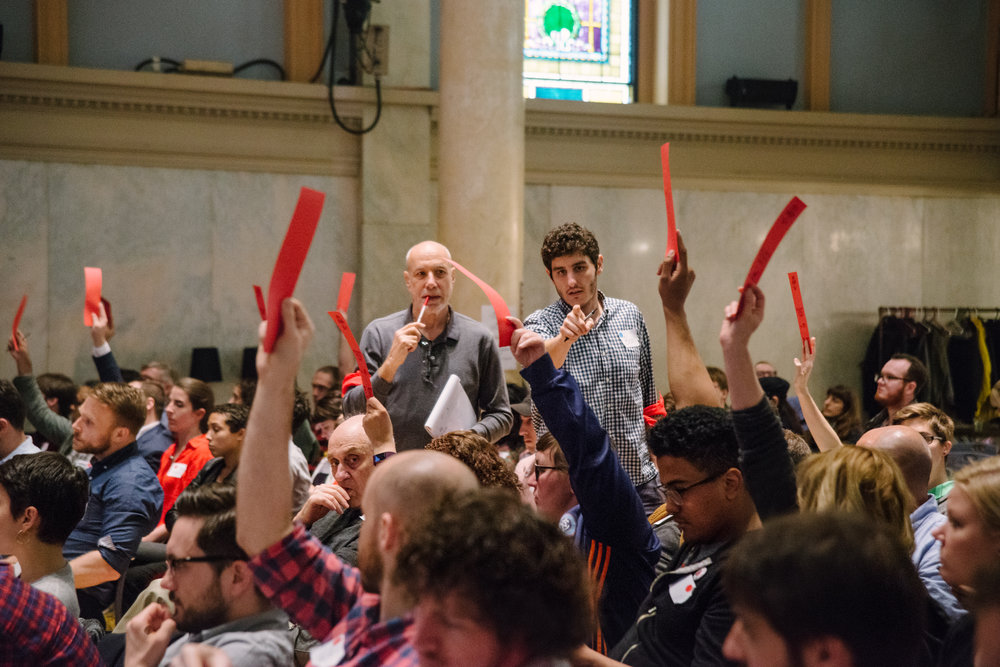If you like this piece, read more about where we stand and sign up to get our occasional email bulletins!
People have many understandings of democracy, and in every understanding democracy needs commonly applied rules in order to work properly. The rules are meant to serve democracy; having rules is not itself democratic.
The basic principle of democracy is that the constituent members of a body decide the policies of that body through accessible deliberation and binding votes. As anybody who reads that anodyne sentence would likely notice, that leaves a lot to be defined. What is accessible deliberation? How is voting carried out, and what makes it binding?
Almost more important than the specific definitions of these terms is that they are commonly agreed upon and uniformly applied. For many chapters of Democratic Socialists of America, as well as for national DSA, this has taken the form of a two-step process: bylaws or a constitution document is ratified by the membership and Robert’s Rules of Orders (hereafter “RONR,” a common abbreviation for “Robert’s Rules of Order Newly Revised”) is adopted as the “rules of procedure” for deliberative meetings — that is, meetings where binding decisions are made.
Despite this adoption of RONR, its use is occasionally controversial in DSA. There are various grounds for this; certainly, they can be unwieldy and unnecessary in more informal or smaller-scale settings, where their strict application can be more martinet than Marxist. But the reasons for, and advantages of, its use are actually very simple and should not be, as we’ll see, very controversial at all. In fact, using RONR is one of the most important tools we have as DSA to build a more democratic organization: one that protects both the rights of majorities and of minorities.
What Are Robert’s Rules of Order?
The RONR is a guidebook of procedural rules (for what is often called “parliamentary procedure”) intended to be used by deliberative, decision-making bodies made up of members with rights of participation. They were created in the nineteenth century, after centuries of developments in rule-making for deliberative assemblies. Robert was an actual guy who summarized the need for procedural rules like this.
“The great lesson for democracies to learn is for the majority to give to the minority a full, free opportunity to present their side of the case, and then for the minority, having failed to win a majority to their view, gracefully to recognize the general will determined by the majority as that of the entire organization, and cheerfully to assist in carrying it out, until they can secure its repeal.”
Robert and the subsequent revisers of his rules were primarily concerned with one thing: “careful balance of the rights of persons or subgroups within an organization’s or assembly’s total membership.” To that end, the rules have been developed to protect the rights of
- The majority
- The minority
- Individual members vis-a-vis the whole organization
- Member non-participants (i.e., absent members)
- The organization as a whole
Keeping this in mind, we can better get at why it is so important for DSA chapters and individual members to become acclimated to, and learn the rules of, parliamentary procedure.
Why Rules at All?
DSA is distinct from other types of political organizations (like non-governmental organizations or the Democratic Party) in that it is a “membership organization.” The defining characteristic of DSA is that it has members, not just activists, “supporters,” or donors. To be active within DSA is to be a member of DSA, which gives a person certain responsibilities as well as certain rights.
Having rights means that those rights need to be clear, recognized, and invocable. A right that cannot be invoked and enforced is meaningless. People need to know their rights and understand the means of exercising and protecting them. This is why chapters have bylaws: to set down on paper, for everybody to access, the scope and limitations of their rights as members. Without this “concrete” reference, members would be members in name only because their rights would be more like folklore.
Similarly, when actually engaging in decision-making, members need to understand the procedure they’re participating in. They need to know how a decision is being arrived at, how they can participate in the decision-making process, what the limitations of their participation are, and when a right is potentially being infringed upon. To this end, “rules of procedure” are common to basically all deliberative bodies. Many use RONR; those that do not — usually large and complex organizations like big city councils and the U.S. Congress — use rules modeled on them but tailored to that body.
The RONR are in this way “objective,” meaning they can be referred to by anybody. Guides to Robert’s Rules are widely available and cheap; they can be summed up in cheat sheets of only a few pages. Without such a reference defining the rights of deliberative participants — just as without written bylaws — nobody has any real “rights”; they have only what they can force others to accept.
Majority and Minority Rights
As we discussed above, RONR are carefully written to balance the rights of the minority with the rights of the majority, and the rights of individuals with those of the organization as a whole. Often for people engaged in radical work, the very idea of the “rights of the majority” can seem silly. Why does the majority need “rights?” The minority faction is the one at risk, exactly because they’re the minority — they should be protected from the majority. The majority having “rights” might seem absurdly unnecessary, like giving them an additional head start.
The need for the minority’s rights against the majority are obvious. Without those protections, an organization cannot have debate, cannot honestly criticize its progress, cannot make progress. And critically, its leadership cannot be held to account. Arguably, the rights of minority factions to participate openly and engage in competition with the majority are the defining features of democratic organizations because without them parliamentary procedures become little more than bureaucratic requirements.
But the minority’s rights only make sense — meaning they’re only coherent — when they’re balanced against the majority’s rights. To understand this, don’t imagine “the majority” and “the minority” as static, unchanging groups. This shouldn’t be hard for socialists. The majority and the minority are fluid, even in contexts with more or less stable factions; for all intents and purposes, “the majority” just means the group within the body that “decides the general will” of the organization. Keep always in mind that in a democratic organization within its deliberative assemblies, the purpose is to become the majority (that is, decide the general will of the organization) on any particular issue or matter before that assembly. If the numerical majority cannot “decide the general will” because of the rules of the organization, in essence the numerical minority becomes the political majority.
Put another way, on any given matter, without “majority rights” an organization’s numerical minority becomes its political majority because they have the power to set the organization’s “general will.” This may mean simply that the numerical minority, by preventing the numerical majority from deciding the “general will” of the organization, are immobilizing the organization. Immobility is a kind of policy, whether it means inaction or the continuation of the status quo.
In a democratic organization, we abide by the principle that a numerical majority of the membership should decide the “general will” of the organization. In some cases, we may want that numerical majority to be a super-majority — RONR allows for this, and further, such provisions can be detailed in chapter bylaws or through “special rules” adopted by a super-majority, for specific purposes (for example, requiring a supermajority to purchase property or endorse a candidate). But the core principle remains that for democratic organizations, the numerical majority, however defined, should also be the political majority — the group that decides the “general will” of the organization.
Based on these observations, we can arrive at a simple principle for decision-making procedures: A numerical majority should be able to determine the “general will” of the organization, subject to the rights of the numerical minority to openly participate in debate and offer alternatives.
Okay, but Why the RONR Specifically?
The RONR have several key advantages as a procedural system.
- RONR are written as “minimums” which allows more flexibility. They are not overly onerous and do not rest on needless ceremony, decorum, or technical expertise. The proper contrast would be with legal procedures, which allow for little to no political discretion or room for error. Ironically, the only practical solution to address the fear of capricious use of procedural rules would be more exacting and technical procedural requirements (i.e., more and more legalistic proceduralism requiring more and more technical expertise). Under the RONR, disputes about the meaning or purpose of terms or procedural errors can be cured simply by referring them to the body to decide by up or down vote, and allow business to proceed. This is related to the second advantage.
- RONR err on the side of serving debate. A core principle of the RONR is that the rules should facilitate debate and open participation by all members; if using RONR is stifling debate, they are not being used properly and there are means for individual or small groups of members to get the floor and raise objections. The most obvious example of this is the right of any member to raise a “Point of Order” (Rule (3) which takes precedence over any other business before the body. When a point of order is raised, the Chair must rule on whether there has been a breach of procedure, and that decision is appealable to the body. If a chair’s decision is appealed, it becomes a debatable matter, meaning the body must stop what it is doing and debate to determine whether the procedure has been proper.
- RONR Provides for Informal Debate. Contrary to the sort of common view, RONR allows for informal debate or non-binding activity for more informal settings. For example, Rule 52 allows the entire body, or sub-bodies, to meet as a “Committee of the Whole” to “consider informally” matters before the body or anticipated to be before the body. (Members should also consider when RONR are necessary at all — for small groupings of handfuls of people with no major decision-making authority, using RONR may be overkill, for example.)
- RONR are objective and widely available, and so learnable by anyone. RONR can seem daunting, but a major advantage over any other available system is that they are widely available, cheaply obtained, and there have been innumerable short-hands and cheat sheets made. Any group within the organization can designate one or a few people to study up on the rules and be prepared to use them to engage in “floor operations” during a contentious deliberative assembly to ensure that their rights are protected. If we assume that political competition between groups of members is inevitable, having pre-written and widely available rules of engagement, with numerous tutorials both online and in written form, is an obvious advantage.
- RONR are widely used and accepted and so important to understand for political reasons. As discussed above, RONR are by a wide margin the most used procedural rules for any number of bodies with which chapter members of DSA will interact. That runs from union locals to political conventions to local and state legislatures. Becoming accustomed to these rules gives DSA members an advantage in political competition within those bodies.
- RONR allows for sophisticated procedure to deal with complex problems. This will be detailed below, but RONR has comprehensive rules for more complex situations that other systems don’t provide for — for example, adoption or amendment of bylaws, discipline and rights of individual members, and the workings of committees and subcommittees vis-a-vis the full body.
- RONR protects political minorities without immobilizing political majorities, and prevents leadership from imposing its will on the members — who need rights to be able to perform their task as “legislators” for the organization. This was covered above, but it bears repeating with some nuance: Because RONR is written with the idea that every individual member is an equally important “legislator” for the organization as a whole, it provides the tools to allow members to hold leadership accountable and express their will, collectively in groups or individually, on equal footing with elected leadership of the body.
The Disadvantages of Alternatives
Besides a number of Robert’s Rules–type systems which have slight variations, there are three other major alternatives often raised in opposition to using the RONR. However, each has serious drawbacks that make RONR much preferable.
Rusty’s Rules
“Rusty’s Rules” is a short-form version of RONR used by the Industrial Workers of the World (“IWW”) and various anarchist formations for their meetings. Rusty’s Rules are pretty good actually, and can be very useful for smaller, less formal settings within local chapters — for example working groups or subcommittees. They can also serve as “training wheels” for members to prepare for more formal deliberative assemblies, like general meetings or a convention, because they derive from RONR. However, the simplicity also means Rusty’s Rules are lacking for more complex procedures necessary to balance the rights of the organization with individuals and the majority with the minority.
That is to say, for RONR to be meaningful, they should be incorporated into a chapter’s bylaws as the rules of procedure; this is typically done by incorporating them “by reference” in a bylaws provision that says that the Chapter’s rules of order “shall be RONR, except where they conflict with these bylaws,” for example. This is necessary because sometimes the organization needs to do more complicated things — for example, amending the bylaws — that are not necessarily provided for in detail in Rusty’s Rules. What’s more, because RONR come with explanatory notes that go into detail about the purpose of various rules, by incorporating them by reference, the members can get clarity as to the meaning or function of the rules. This is not available for Rusty’s Rules.
Consensus Decision-Making
Consensus decision-making rests on the idea that the only justifiable “political majority” (the necessary threshold for a group of members to determine the “general will” of the organization) is unanimous consent — in other words, a decision reached by all members.
The problems with this should be self-evident; see above for the discussion of the meaning of majority rights. Such a procedure opens an organization to what could be called a sort of “heckler’s veto.” It advantages bolder, louder, or more charismatic people. It amplifies the strength of socially connected individuals or factions. It will tend to exclude people who do not immediately grasp the political factions or social connections at play in a chapter or other context. Consensus decision-making is also fatally prone to bad-faith abuse. A determined bad-faith actor can easily derail consensus decision-making.
At the same time, and perhaps more likely, consensus decision-making creates a social pressure not to be a fly in the ointment. Being a conscientious objector is easily characterized as being a wrecker because simply refusing to go along to get along on principle can immobilize the entire body. Under RONR, one person or a small group can express principled opposition without thwarting the will of a political majority.
Bespoke Rules
RONR have developed over many years, and come with copious notes, comments, explanatory rationales, and examples. This is important, because RONR itself recognizes that not every situation can be anticipated. In an unforeseen situation, ambiguities are either thrown to the full body for resolution or members can reason by analogy based on the general guidance provided for by the RONR itself. When organizations attempt to write their own rules, they tend to be either over-detailed or under-detailed; in fact they are often both, as specific known risks are carefully regulated against, which can often admit numerous ambiguities. (Basically, the more detail you add, the more loopholes you create.)
By way of example: RONR basically leaves the grounds for discipline or expulsion of a member to the body’s political will, based on basic categories of bad behavior. Some have attempted to be more specific, listing out the exact types of activities or actions that can be grounds for discipline or expulsion. The effect of a detailed list, however, is that it suggests that something that the membership overwhelmingly disapproves of, because it is not specifically listed, is no longer a potential grounds for discipline or expulsion. That offending member can point to a list and say, “show me where I broke any of these rules.” At the same time, a member who has inadvertently violated a rule to the offense of no one but a political enemy, can be made subject to a painful and humiliating disciplinary proceeding. The membership has in effect created a rule that is both under- and over-inclusive.
The bigger risk with writing rules from scratch is that, again, they are often extremely detailed as a committee of people contribute their unique concerns over potential abuses or best practices. What this means, however, is that the risk of a procedural error is amplified. Procedural rules have to be binding, because if they are merely advisory, people are free to ignore the procedures: if there is no risk to ignoring them, they will be ignored, whether maliciously or out of laziness or momentary convenience. The more detail, the easier it becomes to make an innocent procedural mistake, which then can become the grounds for voiding an entire action taken by a body, because binding procedural rules must be observed.
By way of example: If a body writes a set of procedures for debate of certain types of motions that requires one hour for debate and participation by any party via teleconference, then any single slip up — say if the Wi-Fi goes down 40 minutes in — allows those who lost the political argument to raise an objection of procedural error. And if the majority simply ignores this objection (the likeliest scenario), the procedural rules have become null, and the minority has a legitimate grievance and reason to distrust that rules will be enforced in the future.
RONR, because they are fairly comprehensive and objective (i.e., written by third parties and equally knowable to anybody), avoid this problem; there are all types of “savings clauses” that allow the body to adapt to an unforeseen problem (for example, by just calling for the membership to vote to decide on the meaning of a word) and curative votes (for example, allowing a body to re-adopt a resolution that was voted on after a defective procedure).
There is a political consideration as well. The creation of comprehensive bespoke rules can consume an immense amount of time and become a proxy fight for substantive political issues, which can be mystifying for new members or less-engaged members. And because they cannot anticipate all situations, they will require regular amendment and addition, reigniting destructive and ultimately unnecessary disputes, further demoralizing members who want to engage in political debate and get plugged into action.
Conclusion
When we are thinking about what it means for DSA to be a democratic organization, we have to start with some basic principles. One of those principles is that the political majority, however defined, has to be able to determine policy, but never at the expense of the rights of participation by the political minority. So balancing majority rights with minority rights — which are tightly interconnected — has to be of paramount concern. Using objective, well-documented rules adaptable to a variety of situations is preferable to any of the available alternatives.
DSA and our local chapters have made great progress in engaging in substantive political debate to determine the organizational “general will.” We are not perfect, and more needs to be done, particularly to make sure all members are properly educated and equipped to engage in that debate. But we should take reports of intense substantive debate in chapters with cheer — it means that members are gaining the confidence to engage in political competition, to declare their values and strategies and organize for them. Let the politics be our focus — and for chapter or national leaders, that means the task is to make sure the rules for decision-making always serve more and better debate.




